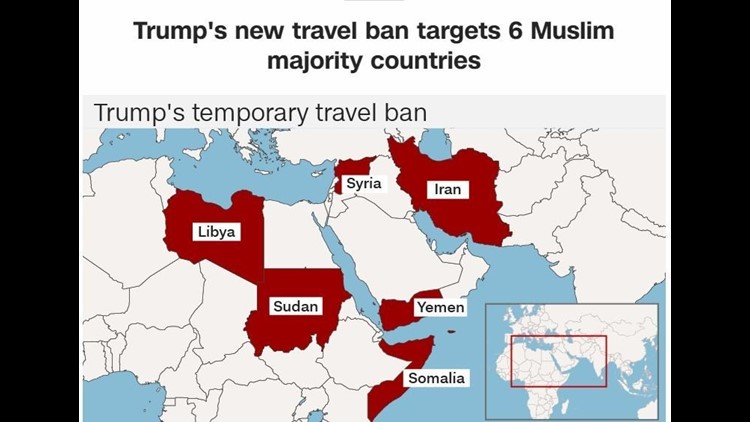BREAKING NEWS: The attorney general’s office of Washington state will file an amended complaint asking federal Judge James Robart in Seattle to block President Donald Trump’s new travel ban, according to a source with knowledge of the planning.
The source said the state will file the amended complaint and motion to enforce Robart’s original preliminary injunction at approximately 11 a.m. ET Monday. Washington and Minnesota will also be asking for a hearing on the matter Tuesday.
Last week, the state’s attorney general, Bob Ferguson, filed court papers arguing that the new executive order remains legally flawed, and urged Robart to enforce his earlier ruling against the new travel ban as well.
On Friday, Robart ruled that neither the Justice Department or the states had properly teed up the issues for him, and requested more formal briefings.
The states collectively will also be filing around 50 new “declarations” setting forth many of the harms they claim to face under the new executive order, which is slated to go into effect on Thursday.
ORIGINAL STORY: Federal courts across the country have seen a flurry of activity over the last week as challengers of President Donald Trump’s new travel ban seek to block it before it ever goes into effect.
Trump signed a new executive order last week banning foreign nationals from six Muslim-majority countries from entering the US for 90 days and banning all refugees for 120 days. The new order excludes those with green cards and valid visas.
But those who had filed lawsuits against the original executive order have popped back to the surface with gusto, arguing the new ban fails to adequately remedy the legal failings of the last version. At least one Syrian man successfully blocked application of the new travel ban for his family last week. Other judges have asked the parties to file more legal briefs explaining their positions.
Here are the cases to watch before the new executive order goes into effect on Thursday:
State challenges
One day after Trump signed the new executive order, Hawaii mounted the first legal challenge last Tuesday. Attorneys for the state argue that new executive order remains discriminatory and harms the economy, and have asked a federal judge to issue a temporary restraining order blocking several provisions of the new order. The Justice Department will have a chance to respond on Monday, and then the judge will hear oral arguments on Wednesday.
Washington and Minnesota soon followed in Hawaii’s footsteps last week, announcing that they, too, planned ask a federal judge in Seattle to halt the new travel ban. Attorneys in that case argue that the new executive order “purports to reinstate two provisions of the prior order” that US District Court James Robart blocked last month, and therefore, the new order must remain suspended as well.
The Justice Department declined to comment to CNN on the status of any ongoing litigation. But it filed a “notice” with Robart after the order was signed last week, claiming that the administration believes the new executive order “falls outside of the scope” of Robart’s earlier ruling. The administration cited the substantial changes to the executive order, arguing that it “clarifies and narrows the scope of executive action regarding immigration, extinguishes the need for emergent consideration, and eliminates the potential constitutional concerns identified by the Ninth Circuit.”
Attorneys general from Maryland, Massachusetts, New York, Oregon and California confirmed they are also planning to join the lawsuit in Seattle.
But late last week, Robart told everyone: not so fast.
He noted that the parties haven’t technically asked him to rule on any new request yet, and therefore, declined to resolve any of the outstanding issues until one side files a procedurally proper motion under the local rules.
Individual challenges
At least one of the individual challengers of the new executive order had success last Friday.
A Syrian “John Doe” plaintiff living in Wisconsin successfully argued that the new travel ban is preventing him from reuniting with his wife and child who are currently trapped in Aleppo. A federal judge in Madison acknowledged some “important differences” between the original executive order and the new one, but ultimately concluded this particular Syrian family faces “a significant risk of irreparable harm” given “the daily threats to the lives plaintiff’s wife and child remaining in Aleppo, Syria.”
As result, the judge issued a temporary restraining order blocking application of the new travel ban in this particular case, but not for any other families.
A federal judge in Maryland has also set a hearing on Wednesday morning to hear another challenge brought by refugee aid groups and several foreign nationals. They allege that many foreign nationals, including those from the six banned countries and refugees, have family in the US and will suffer “as a result of the delaying reuniting with their family members.”
Finally, a lawsuit was filed by a private attorney on behalf of the “people of California,” according to court documents last week. But it was not filed by the state attorney general’s office and unclear whether the judge will allow the case to proceed. A similar lawsuit filed after the original ban was announced, but was quickly dismissed.



